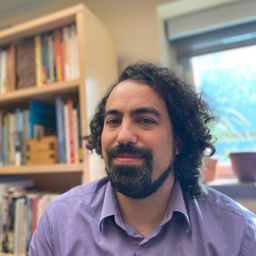
Dr Chao-Shiang Li
Chao-Shiang Li holds a PhD at the Ironbridge International Institute for Cultural Heritage, University of Birmingham, UK. Chao-shiang is the Assistant Professor in the Department of Interior Design, China University of Technology in Taiwan, the advisory of the New Taipei City Museum Development Committee, and the Correspondent of Asian Network of Industrial Heritage. He was the associate researcher of Cultural Properties Research Center, CUTE by conducting a series of heritage programs. His interests lie in how people produce, interpret and consume heritage within a changing and cross-cultural world. As the shifting values in heritage are complicated and continuing, he is interested in exploring the relationship between the interpretations and (re)use of heritage by visiting the contextual narrative.
1. Li, C.S. (2022). The Development of the Public Sphere of Industrial Heritage in Taiwan: From Space Reuse to Place Making. In L.J. Wang & C.H. Wu, Diversified Breathing: Shuttling through the Public Sphere of Taiwanese Culture. Kaohsiung: CHULIU BOOK (In publishing).
2. Li, C.S. (2022). The International Regime on Industrial Heritage-A Case Study of Asian Network of Industrial Heritage. In J.C.Y Liu & C.Y. Wei eds. Taiwan’s International Cultural Relations: Culture as a Method. Kaohsiung: CHULIU BOOK, pp.149-192.
3. Li, C.S. (2020). A Curator for Urban Historic Locales and Narratives: Kaohsiung Museum of History. Chinese Association of Museums, ICOM Kyoto 2019 Conference Proceedings. Taipei: Chinese Association of Museums, pp. 310-327.
4. Li, C.S. (2020). Motivation of Youth Participation in Industrial Heritage, ANIH Bulletin 5, December 2020, pp. 7-11.
5. Li, C.S. (2020). A Converged Procession: Reinvention of Tradition in Mining Cultural Landscape. In: Eric Devos, Anne-Sophie Meurice, Anne-Françoise Morel Eds. Walking with Saints: Protection, Devotion and Civic Identity-The Role of the Landscape. Ronse: G.O.K.R.T.I. – C.H.A.R.T.I., pp. 246-257.
6. Li, C.S. (2019). The Forestry Culture and Technical Legacy in Taiwan: A Perspective of Heritage Conservation. Bimonthly Periodical, 152, p. 1-4.
7. Li, C.S. (2018). The History and Development of Taiwan’s Industrial Heritage. The Report of Minnan-Taiwan Cultural Development, pp. 146-168.
8. Li, C.S. (2018). The Conservation and Cultural Tourism of UK Heritage Railways. Journal of the National Taiwan Museum, 138: 32-41.
9. Li, C.S. (2018). Open Air, Open Mind-the creative approach of industrial heritage interpretation in Gold Museum, Gold Museum, New Taipei City Government Journal: 71-82.
10. Li, C.S. (2017). Revaluing Industrial Heritage: Participatory Governance in Urban Forestry Heritage and Historical Bridge Conservation. The Historic Environment: Policy & Practice, 8(3): 1-17.
11. Li, C.S. (2016). Visiting historic sites to open up future possibilities: The heritage of British rail. Journal of Cultural Heritage Conservation, 35:92-107.
12. Li, C.S. (2014). A Complex Tradition: Reading Japanese Industrial Heritage in Taiwan. Traditional Dwellings and Settlements Review. Whose Tradition? Biennial Conference of the International Association for the Study of Traditional Environments, 2014, Kuala Lumpur, Malaysia. 26(1): 48.
Sessions in which Dr Chao-Shiang Li participates
martes 30 agosto, 2022
The heritage of industrialisation is endowed with an emerged position or meaning to the past as well as the future, and this is part of the modernisation process within the context of industrialisation. The knowledge economy leads to the development of the remains of industrial culture towards a second industrial heritage revolution. The challenge follows and interrogates how industrial heritage can be made relevant (useful/meaningful) in an ostensibly post-industrial world. It refer...
jueves 1 septiembre, 2022
Many of the remained big scale Industrial heritage in Taiwan were the products of the Japanese colonial period between 1895 and 1945, which spans the first half of the twentieth century. This fifty-year colonial industrialisation is arguably Taiwan’s most influential industrial heritage because it began a rapid process of modernisation that is continuing today. The key to this process is the industrialisation that led to the development of main parts of the island, catalysed new communitie...
Many of the remained big scale Industrial heritage in Taiwan were the products of the Japanese colonial period between 1895 and 1945, which spans the first half of the twentieth century. This fifty-year colonial industrialisation is arguably Taiwan’s most influential industrial heritage because it began a rapid process of modernisation that is continuing today. The key to this process is the industrialisation that led to the development of main parts of the island, catalysed new communitie...
Sessions in which Dr Chao-Shiang Li attends
domingo 28 agosto, 2022
A one-day itinerary on the opening day of the conference will allow visitors to discover Exporail in Saint-Constant, the Beauharnois hydroelectric plant and the Cotea...
Explore the banks of the Lachine Canal, the cradle of industry in Canada. Benefiting from access to hydraulic power, maritime and rail transport, large numbers of industrial facilities were built along its length. Thousands of Montrealers have lived and worked there. The banks of the canal are now a linear park, and the site of many residential developments.A walking tour designed and guided by Heritage Montréal. The visit will be in French and will...
Join the conference organisers and TICCIH board members for a welcome cocktail and some festive words of introduction, in the former forge of the École technique de Montréal, founded in 1909, now part of the Université du Québec à Montréal campus.
lunes 29 agosto, 2022
Si la vallée du canal de Lachine a été le berceau de l’industrialisation canadienne, la géographie industrielle métropolitaine ne s’y est pas confinée, peu s’en faut, Outre les grandes concentrations d’entreprises des quartiers centraux, elle est constituée des réseaux infrastructuraux, d’une douzaine de centrales hydroélectriques et des ensembles manufacturiers disséminés dans une quinzaine de petites villes aujourd’hui intégrées dans l’aire métropolitaine. La conférence proposera un surv...
martes 30 agosto, 2022
This session will allow us to explore, through nine international case studies, the different strategies for the development of industrial heritage as well as their impacts on communities and their territory. The analysis of museums, cultural spaces, itineraries and urban developments will be an opportunity to highlight the questions of identity, meaning, relevance and impact that animate all the actors of this heritage in transformation.
During the Industrial Revolution coal was the most important energy source for both homes and industries. At the time, coal mining created strong regional industrial identities and mentalities, as well as industrial images and imaginaries in the eyes and minds of external observers. Such identities and ideas of coal would go on to shape industrial landscapes and communities.The papers presented in this session investigate the s...
This session focuses on company towns from the perspective of urban planning. “Company towns” are here defined as single-enterprise planned communities, usually centered around a single industry, where a company commissions an urban plan, builds housing for its workers, and sets up recreational, commercial, institutional or community facilities. While these are now endangered by a second wave of deindustrialization, we observe that, aside studies or monographs of individual towns that popu...
Drawing on case studies from diverse social, cultural, and political contexts the papers in this session discuss the different responses to maintaining and assessing not only the physical sustainability of industrial heritage but also the sustainability of its social values and meaning.
It is widely accepted that understanding a historic place is a critical first step to guide subsequent management and conservation. Industrial sites present a number of challenges as understanding their form, function, design, boundaries, and conservation often requires a high degree of technical expertise and experience. In Canada, gaining this expertise and information sharing is hampered by a limited number of institutions offering training in industrial archaeology and the lack of a na...
This session focuses on company towns from the perspective of urban planning. “Company towns” are here defined as single-enterprise planned communities, usually centered around a single industry, where a company commissions an urban plan, builds housing for its workers, and sets up recreational, commercial, institutional or community facilities. While these are now endangered by a second wave of deindustrialization, we observe that, aside studies or monographs of individual towns that popu...
As a "continent” country, in which industrialization began as early as the 19th century, Canada has seen through deindustrialization and urban redevelopment, parts of this heritage have been either altered or destroyed. Yet, Canada still possesses a very significant industrial heritage. With Canada being a confederation, approaches to the protection and the safeguard of its industrial heritage differs throughout the provinces and territories of the country. The same is true of i...
Industrialization processes have been global from their very beginning. However, their interpretation still tends to be limited to specific locations or regions, and to specific time periods. Regularly, for example, it is stated that the industrial revolution started in Europe, from where it spread to the world, supposedly bringing technological and social progress to „less developed“ countries. Earlier periods of technology and knowledge transfer processes, that were already in place in t...
Efforts to preserve industrial heritage occurs in a socio-economic and political context. But what is being preserved and for whom? And, relatedly, what is the relationship between industrial heritage sites and the deindustrialized working-class communities that often adjoin them? The keynote will consider the ways that the preservation of Montreal’s Lachine Canal, Canada’s premier industrial heritage site, has enabled gentrification processes that have forc...
miércoles 31 agosto, 2022
Visit of the permanent exhibition : À cœur de jour, grandeurs et misères d'un quartier populaire, which traces the history of one of the oldest industrial and working-class neighborhoods in Montreal. Discovery of the old Généreux bathhouse, a building that recalls a time when most working-class dwellings had neither bath nor shower. Presentation of some elements of the neighborhood's heritage on the way between UQAM and the Écomusée.The visit will be guided in French by René Binette...
The Soulanges Canal is an infrastructure, located on the north shore of the St. Lawrence, which was opened to maritime traffic in 1900, succeeding the "old canal" of Beauharnois (established since 1843 on the north shore of the St. Lawrence). The Soulanges Canal was abandoned in 1959, when the current St. Lawrence Seaway linking the Great Lakes to the Atlantic opened.The Soulanges Canal was designed by the engineer Thomas Monro (1831-1903). Of Irish origin but trained in civil engin...
In this lecture, I would like to talk about deindustrialised communities, heritage and memory in the context of right-wing populism. Drawing on studies of memory and heritage, I argue that right-wing populists have cornered the market on talking about the past of deindustrialised communities. They have successfully misrepresented this rich and complex history to fuel rage, resentment, fear and reactionary nostalgia. Indeed, ‘the past’, and in particular the industr...
jueves 1 septiembre, 2022
The use of industrial heritage is a profoundly important factor in the process of creating a sustainable economic, social, and political future for many communities occupying industrial heritage landscapes. More than ever we recognize the need for such communities to be capable of shaping and expressing their heritage in different forms in the context of current events and issues, and in doing so to inform both contemporary decision-making as well as the way their industrial heritage is re...
This lecture will argue that the landscapes of industrial heritage that can be found in different parts of the world are directly related to the place-specific trajectories of deindustrialization. In other words: the different ways in which deindustrialization impacts on local communities has a direct bearing on the emergence of forms of industrial heritage. I will differentialte between deindustrialization paths and related industrial heritage regimes in a) Anglo-...
The South Central district is a former industrial and working-class neighbourhood with a rich and unique heritage. The visit will allow us to discover, among other things, the Macdonald Tobacco factory and the Raymond candy factory, the old workers' housing typical of the district, and the reuse of old buildings for cultural and community purposes. The activity will start at the Frontenac metro station and will end with a visit to the Écomusée du fier monde. Staff will be avail...
viernes 2 septiembre, 2022
In the refusal of people in communities abandoned by industrial capital to abandon their own places, we can read an implicit critique of the mobility and unaccountability of capital, raised by those who were once inside (however tenuously or uncomfortably) and now find themselves marginalized, “left behind.” The desire to catch up again, whether through attracting new investment or transvaluing abandoned sites as tourist attractions, makes this an essentially conservative critique that is ...
sábado 3 septiembre, 2022
Uncover the vestiges of the Canadian Pacifie Railway tracks and the former Angus Shops, which played integral raies in the industrial and residential development of Rosemont. This tour wi/1 give you insight into the industrial past of the neighbourhood and its new life bath as a place to live and to work.A tour designed and guided by Heritage Montreal. Departure at the corner of Rachel and Dézéry streets, 10 minutes walk from Prefontaine metro station













